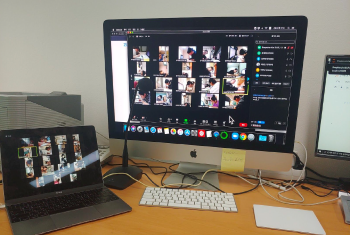
As the 2020 spring semester was proceeded through online classes, problems concerning online exams were raised as midterms approached. One of the unsolved issues is preventing students from cheating. Due to online studying environments, it has become harder for professors to supervise students during tests. The possibility of students cheating by sharing answers through messages during tests, searching for answers online, and obtaining a test-taking proxy are what makes online testing problematic.
The various types of online teaching styles among professors account for the impossibility to set a single guideline to prevent cheating. To gather information on the types of midterm tests business major students would be taking, the College of Business Administration student council, Begin;us, conducted a survey from April 27 to May 5.
Among a total of 64 students who participated in the survey, 96.9 percent replied they were taking online tests while 3.1 percent were to take tests offline. Among the participants, 47 students elaborated on their online testing methods. The majority of the responses said that their online tests would be held through an open book format with a time limit. Students given this task would have to download the test files uploaded by the professors and submit their works in the set time. Other responses showed that the midterms were altered to quizzes or assignments, conducted live through video programs like ZOOM, or were changed to either all essay questions.
Although it was evident many professors chose to take online tests, the efforts to prevent cheating seemed to differ widely according to the nature of courses.
One of the courses which had and needed numerous guidelines for the test was Professor Seo Jeehyeon’s linear algebra and advanced engineering courses. As the classes had 80 students, four ZOOM rooms were opened with 20 students in each one. To inform the students of test guidelines, she opened two orientation classes on how the online testing will operate and gave two mandatory guidelines on the procedure students needed to follow during the tests.
Procedures included checking identifications, moving the camera to prove one’s surrounding does not have any class materials, and setting the camera at a certain angle.
Professors and students confront obstacles in online testing
Students were ordered to set the camera above them so that their hands were shown and faces only viewing the computer screen could be seen. Such process was all recorded and the students turned in their answers using a scanner app on their phones within a designated period of time.
“I chose live online testing and provided such guidelines because many students were sensitive about the possibility of cheating even if the courses used absolute grading,” Seo said. “Moreover, the fact that these are math courses makes it impossible to alter tests into essays or project assignments.”
After the test on Engineering Mathematics ended, Professor Seo received feedback on how students felt about this procedure and whether it provided an environment that prevented cheating.
“With a total of 112 replies, 88.4 percent of the students agreed that the methods formed a strict environment suitable for testing,” Seo noted. “While some students thanked me for such supervision, others commented that some noises disrupted them, and were suspicious of one student whose phone camera was temporarily turned off due to low battery.”
Regardless of the professor’s method, a student who took the test and wished to stay anonymous had negative thoughts saying that the professor’s intervention during the test by talking to those acting suspicious was more of a disruption to other students.
On the other hand, courses adequate for essays and assignments were rather less troublesome. Professor Jung Hae-won who teaches North Korean Studies, found that open book essay questions will not be an issue for grading. When inquired on the possibility of cheating, Jung replied that the answers to given questions will not be fully dependent on class materials. An hour will be the limited time to students to submit their tests.
Classes in the English Language and Literature Department such as Introduction of Drama and American Novel and Its Tradition all took tests in essay forms. As a way to prevent sharing answers with peers, calculating similarity rate between students’ answers and their answers with outer sources was proceeded through Turnitin. If any plagiarism was detected, students are subject to the university's policies on plagiarism or even be given an F.
There were courses which changed the percentage of assignments and quizzes or inserted additional quizzes to pre-existing exams. This was to maintain fairness in testing by minimizing usage on online platforms as much as possible.

